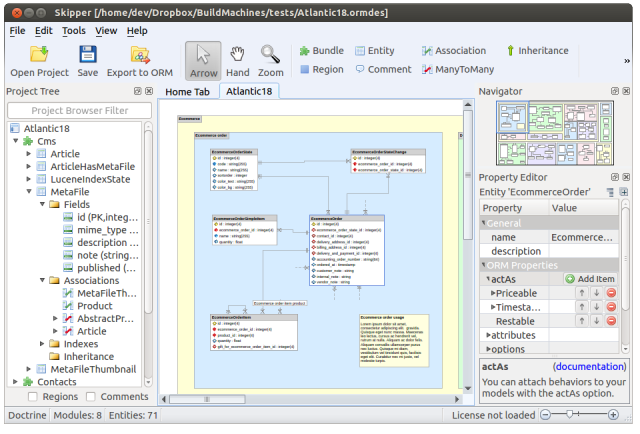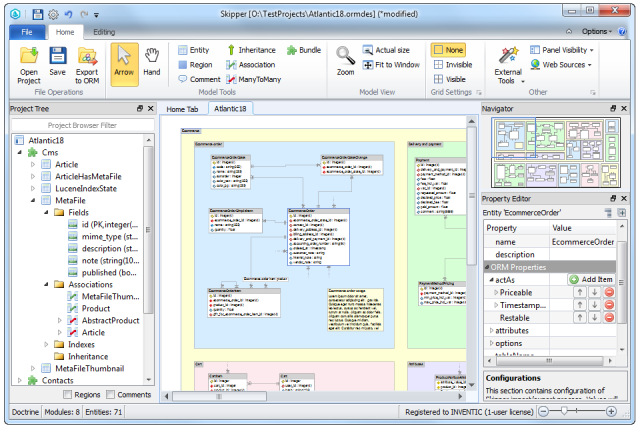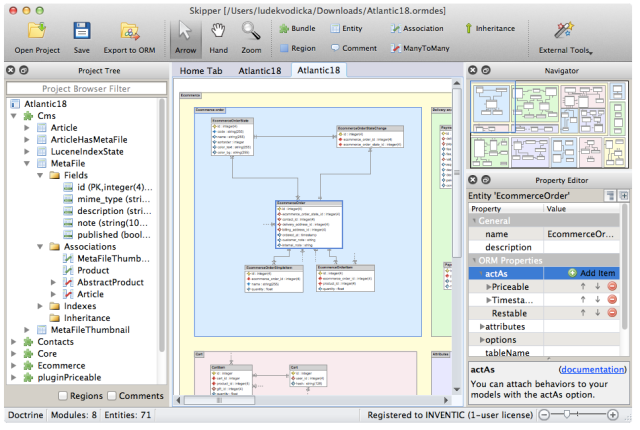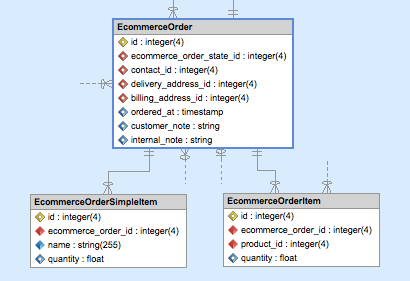<?php
use Doctrine\ORM\Mapping as ORM;
#[ORM\Entity]
#[ORM\Table(name: "ecommerce_order", options: ["charset"=>"utf8","collate"=>"utf8_unicode_ci"])]
#[ORM\ChangeTrackingPolicy("DEFERRED_IMPLICIT")]
class EcommerceOrder
{
#[ORM\Id]
#[ORM\Column(type: "integer")]
#[ORM\GeneratedValue(strategy: "AUTO")]
private $id;
#[ORM\Column(type: "timestamp", length: 255, nullable: true)]
private $ordered_at;
#[ORM\Column(type: "string", nullable: true)]
private $customer_note;
#[ORM\Column(type: "string", nullable: true)]
private $internal_note;
#[ORM\OneToOne(targetEntity: "Address", inversedBy: "EcommerceOrders")]
#[ORM\JoinColumn(name: "billing_address_id", referencedColumnName: "id", unique: true)]
private $BillingAddress;
#[ORM\OneToOne(targetEntity: "Address", inversedBy: "EcommerceOrdersDelivery")]
#[ORM\JoinColumn(name: "delivery_address_id", referencedColumnName: "id", unique: true)]
private $DeliveryAddress;
}
<?php
use Doctrine\ORM\Mapping AS ORM;
/**
* @ORM\Entity
* @ORM\Table(schema="ecommerce_order", options={"charset":"utf8","collate":"utf8_unicode_ci"})
* @ORM\ChangeTrackingPolicy("DEFERRED_IMPLICIT")
*/
class EcommerceOrder
{
/**
* @ORM\Id
* @ORM\Column(type="integer", length=4, options={"unsigned":true})
* @ORM\GeneratedValue(strategy="SEQUENCE")
*/
private $id;
/**
* @ORM\Column(type="timestamp", nullable=true)
*/
private $ordered_at;
/**
* @ORM\Column(type="string", nullable=true)
*/
private $customer_note;
/**
* @ORM\Column(type="string", nullable=true)
*/
private $internal_note;
/**
* @ORM\OneToOne(targetEntity="Address")
* @ORM\JoinColumn(name="billing_address_id", referencedColumnName="id", unique=true)
*/
private $BillingAddress;
/**
* @ORM\ManyToOne(targetEntity="Address")
* @ORM\JoinColumn(name="delivery_address_id", referencedColumnName="id")
*/
private $DeliveryAddress;
}
<?xml version="1.0"?>
<doctrine-mapping
xmlns="http://doctrine-project.org/schemas/orm/doctrine-mapping"
xsi="http://www.w3.org/2001/XMLSchema-instance"
schemaLocation="http://doctrine-project.org/schemas/orm/doctrine-mapping.xsd">
<entity
name="EcommerceOrder"
change-tracking-policy="DEFERRED_IMPLICIT"
schema="ecommerce_order"
repository-class="Doctrine\ORM\EntityRepository">
<id name="id" type="integer" length="4">
<generator strategy="SEQUENCE"/>
<options>
<option name="unsigned" value="true"/>
</options>
</id>
<field name="ordered_at" type="timestamp" nullable="true"/>
<field name="customer_note" type="string" nullable="true" version="true"/>
<field name="internal_note" type="string" nullable="true" version="true"/>
<many-to-one field="DeliveryAddress" target-entity="Address">
<join-columns>
<join-column
name="delivery_address_id"
referenced-column-name="id"
on-delete="CASCADE"/>
</join-columns>
</many-to-one>
<one-to-one field="BillingAddress" target-entity="Address">
<join-columns>
<join-column
name="billing_address_id"
referenced-column-name="id"
unique="true"
on-delete="CASCADE"/>
</join-columns>
</one-to-one>
<options>
<option name="charset" value="utf8"/>
<option name="collate" value="utf8_unicode_ci"/>
</options>
</entity>
</doctrine-mapping>
EcommerceOrder:
type: entity
changeTrackingPolicy: DEFERRED_IMPLICIT
schema: ecommerce_order
repositoryClass: Doctrine\ORM\EntityRepository
fields:
id:
id: true
type: integer
length: 4
generator:
strategy: SEQUENCE
options:
unsigned: true
ordered_at:
type: timestamp
nullable: true
customer_note:
type: string
nullable: true
version: true
internal_note:
type: string
nullable: true
version: true
options:
charset: utf8
collate: utf8_unicode_ci
oneToOne:
BillingAddress:
targetEntity: Address
joinColumns:
billing_address_id:
referencedColumnName: id
unique: true
onDelete: CASCADE
manyToOne:
DeliveryAddress:
targetEntity: Address
joinColumns:
delivery_address_id:
referencedColumnName: id
onDelete: CASCADE
<?php
namespace App\Models\Base;
use Illuminate\Database\Eloquent\Model;
class EcommerceOrder extends Model
{
/**
* Do not automatically manage timestamps by Eloquent
*
* @var bool
*/
protected $timestamps=false;
/**
* The attributes that should be cast to native types.
*
* @var array
*/
protected $casts=[
'id'=>'integer',
'ecommerce_order_state_id'=>'integer',
'contact_id'=>'integer',
'delivery_address_id'=>'integer',
'billing_address_id'=>'integer',
'ordered_at'=>'datetime',
'customer_note'=>'string',
'internal_note'=>'string'
];
/**
* The guarded property should contain an array of attributes that you do not want to be mass assignable.
*
* @var array
*/
protected $is_guarded=['internal_note'];
/**
* The attributes that are mass assignable.
*
* @var array
*/
protected $is_fillable=[
'id',
'ecommerce_order_state_id',
'contact_id',
'delivery_address_id',
'billing_address_id',
'ordered_at',
'customer_note'
];
public function Contact()
{
return $this->belongsTo('\App\Models\Contact','contact_id','id');
}
public function DeliveryAddress()
{
return $this->belongsTo('\App\Models\Address','delivery_address_id','id');
}
public function BillingAddress()
{
return $this->belongsTo('\App\Models\Address','billing_address_id','id');
}
public function OrderItem()
{
return $this->hasMany('\App\Models\EcommerceOrderItem','ecommerce_order_id','id');
}
public function OrderSimpleItem()
{
return $this->hasMany('\App\Models\EcommerceOrderSimpleItem','ecommerce_order_id','id');
}
}







